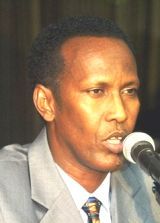Somali premier at core of political crisis
Aug 9, 2006 (NAIROBI) — Somali Prime Minister Ali Mohamed Gedi, a veterinarian thrust into office two years ago, finds himself clinging to power in the Horn of Africa nation.
 But whether he stays or goes, many believe he is the pivotal figure in deciding the fate of his fragile administration — the 14th attempt to restore central rule since Somalia fell into anarchy in 1991 after dictator Mohamed Siad Barre was ousted.
But whether he stays or goes, many believe he is the pivotal figure in deciding the fate of his fragile administration — the 14th attempt to restore central rule since Somalia fell into anarchy in 1991 after dictator Mohamed Siad Barre was ousted.
After narrowly surviving a no-confidence vote on July 30, Gedi must name a streamlined cabinet by Monday and deliver on a plan of action to be reviewed in three months under a deal brokered with President Abdullahi Yusuf on Sunday.
“Whether he stays is not important. It is whether he creates a competent cabinet,” legislator Abdullahi Haji said in Baidoa, the government’s temporary capital and only stronghold at home.
If Gedi is successful, it could bring the government a second chance after it failed to extend its authority beyond Baidoa or reach agreement with newly powerful Islamists, who seized the capital Mogadishu and a strategic swathe of southern Somalia in June.
If he fails, his removal could create a space that may draw the Islamists into sharing power, Somalis and diplomats say.
The big challenge now is for Gedi to create a cabinet that will please Yusuf and the Islamists amid fears of war. But many are sceptical he is up to the job.
“He has bad advisers, he has no political instincts, he hasn’t got the support of his clan. Tell me what he has? He has delivered nothing,” said one European diplomat, who declined to be named because of ongoing relations with Gedi.
“Maybe what he has is the Ethiopians.”
FROM VET TO PM
Gedi emerged from obscurity in November 2004, a political unknown who had not even been a member of parliament until his appointment as prime minister at peace talks in Kenya.
According to several participants, Gedi was flown in by Ethiopia — a major ally of the then newly elected Yusuf — and named head of the government at their insistence. Many Somalis believe he and Ethiopian leader Meles Zenawi have personal ties.
Gedi has since faced an assassination attempt in Mogadishu, a rejected first cabinet, rifts with the president and the desertion of half his cabinet last month before Yusuf dissolved it on Monday.
His alliance with the Ethiopians has infuriated the Islamists, and further inflamed tensions inside his Hawiye clan since he has the job many coveted. The post was allocated to the Hawiye under the peace plan’s power-sharing formula among clans, which are the ultimate arbiters of Somali life.
The Islamists have multiplied that problem, since they sprang from Hawiye sharia courts in what many say is evidence at clan frustration with him.
“The situation has angered many in Mogadishu and the Hawiye as a clan, because they feel he is not representing them,” said an African diplomat who works with the Somali government through IGAD, the regional body that sponsored its peace talks.
Many Somalis have argued that only his removal will appease the Islamists, who are due to have a second round of talks with the government in Khartoum in the middle of the month.
‘HANDS TIED’
Gedi’s resistance to those talks sparked a rift with Yusuf and parliament Speaker Sharif Hassan Sheikh Adan that resulted in the weekend deal brokered by Ethiopia in Baidoa.
“Yusuf knows the prime minister is a problem. But he cannot do anything, his hands seem to be tied. He is protected now in Baidoa by the Ethiopians,” the African diplomat said. “They are the ones giving him the smallest bit of power he has.”
Another African diplomat, who is helping broker the talks with the Islamists and asked not to be identified, said Yusuf had done well to hold Gedi accountable.
“I think finally they seem to be working now, in the sense that the president is assuming his responsibility of asking his prime minister to deliver or step back,” the diplomat said.
Though the Gedi-Yusuf deal says the prime minister is appointed for six months, his cabinet will automatically dissolve if it fails to produce results in three months.
Gedi’s enemies have their knives sharpened.
“We can bring back the motion after six months and I don’t think he can survive it,” legislator Ali Basha — who moved the July 30 no confidence vote — told Reuters by phone from Baidoa.
(Reuters)
